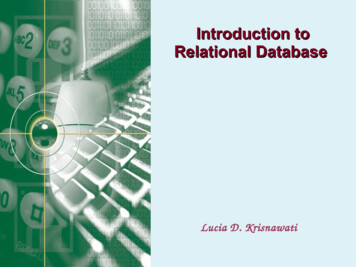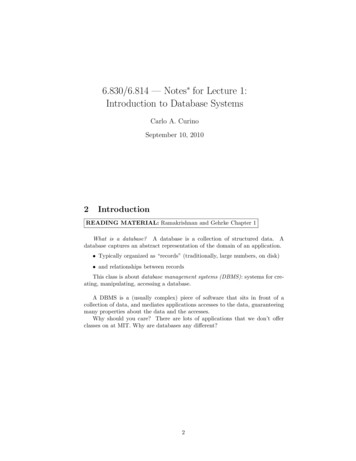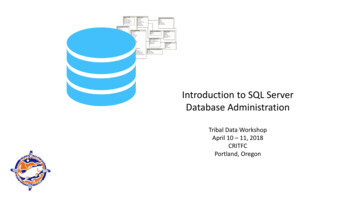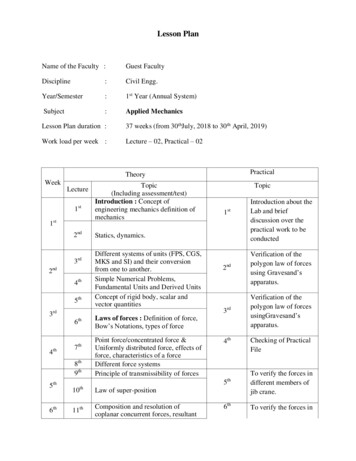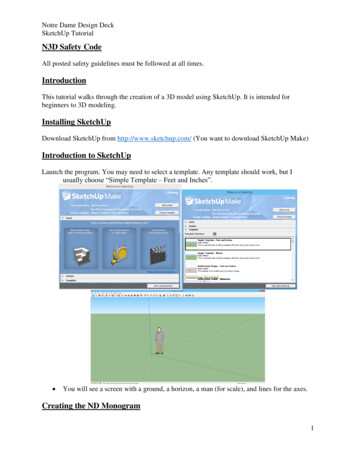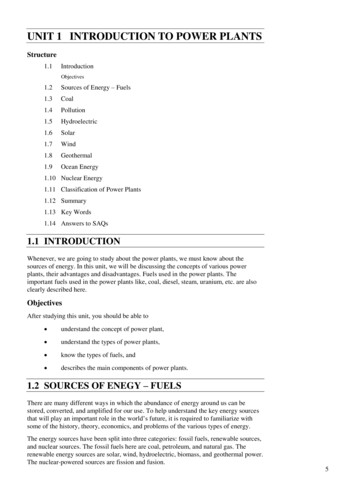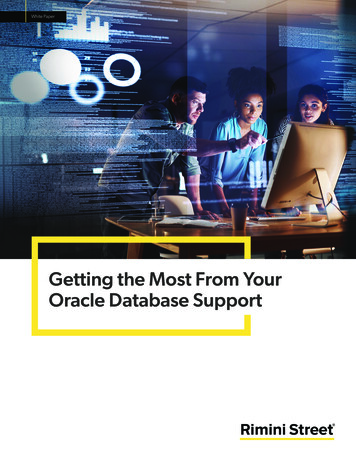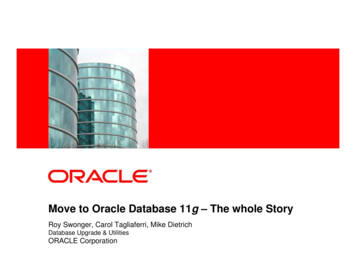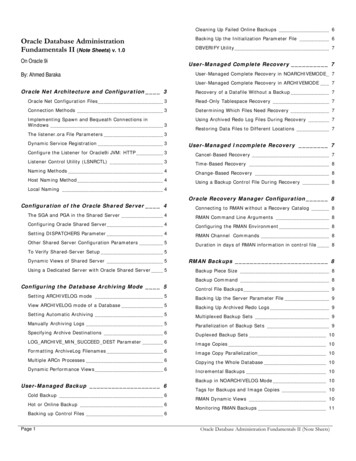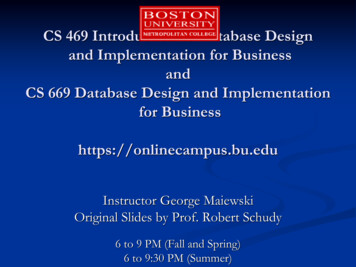
Transcription
CS 469 Introduction to Database Designand Implementation for BusinessandCS 669 Database Design and Implementationfor Businesshttps://onlinecampus.bu.eduInstructor George MaiewskiOriginal Slides by Prof. Robert Schudy6 to 9 PM (Fall and Spring)6 to 9:30 PM (Summer)
Differences between CS469 and CS669CourseCS469CS669Credits4 undergraduate4 quiredQuizzesAt home online QuizzesAt home online QuizzesAssignmentsAdvanced exercises extracreditBasic and advancedexercises requiredTerm projectOptional, for extra creditRequiredFinal ExamIn class closed book onlineIn class closed book online
How to reach me The best way to reach me is by email through thecourse web site. Direct email can be sent to eithermaiewski@bu.edu or george.maiewski@gmail.com . I pick up my email many times per day. I can meet with you before class, during the break orafter class. Special meetings if necessary.
Preparation for this class This class has no prerequisites other thancomputer literacy and willingness to study andlearn.I will help students without programming orother background, so that no one is left behind.You do need to be computer literate; we willinstall Oracle, use web sites and do other geekythings.
Our main Rob and Coronel text Our text for this course is Database Systems: Design,Implementation & ManagementEdition: 11thAuthor: Coronel, C.M., Morris, S.,Publisher: Cengage/Course TechnologyISBN 9781285196145.It is very accessible and a “good read.”We will cover the text one chapter per week.The text is available used. If you really need to savemoney, you can purchase the 9th or 10th edition for muchless, but I urge you to purchase the 11th, because it ismore up to date.It is readily available from the BU bookstore, Amazon,and many other web vendors.Beware that web vendors sometimes take many weeks todeliver, may ship earlier editions, and may not refundyour money.
The Term Project CS669 students must complete a significant termproject which involves designing andimplementing a modest but significant databasesystem.The default term project is to design andimplement a database system for a simple DVDrental business vaguely similar to NetFlix .Undergraduate students taking CS469 maycomplete a term project for extra credit.You do not need to use Oracle for your projects.
Extra Credit Projects You may do extra credit projects on any database topicof your choice.You can ask me for help if you wish.Extra credit projects won’t hurt your grade. A good extracredit project may lift your grade if you are close to thehigher grade but not quite there.Write a short proposal if you would like to do an extracredit project, so I can check the reasonableness of thetopic and the required effort.
Researching small topics for the class In a lecture or discussion a question may arise that youwould like to research and present the results to the class.I will sometimes ask for volunteers, or you can volunteer.Usually we will want the answer at the next class session,or posted to the course website.Database is a huge technology and business area, and thisis an important part of learning how to answer databasequestions.I give classroom contribution points for these smallresearch efforts.These should be small efforts; if it turns out to be difficultlet me know. That’s OK.
Ask lots of questions What seems like a “stupid question” or answer is one thatshows that there is something that you don’t understand.If you don’t understand something it is likely that yourclassmates don’t understand it too.Stupid questions and answers help everyone, including me.So ask lots of questions, particularly stupid questions, anddon’t be afraid to answer my questions.I give extra class participation credit for good questions andanswers, particularly good stupid ones.The only stupid question is the one that you don’t ask; thereare no bad questions.
Grading Your grade is based on your performance in five areas: 25% of your grade is based on weekly graded quizzes. 15% of your grade is based on graded homeworks. 30% of your grade is based on a comprehensive final exam. 20% of your grade is based on your term project. 10% of your grade is based on classroom contributions,including questions, discussion, and small topics that you haveresearched for the class.It is occasionally possible to earn more than 100% for anexceptional answer or an extra credit problem.I don’t grade on the curve, and would be delighted ifeveryone earned an A.
Grading standards The grade of “C” is the lowest grade acceptable forcredit toward MS degree requirements. MS students must have a grade point average of atleast 3.0 to graduate. A grade of “D” is the lowest passing grade forundergraduates.GradeGrade PointsA4.0A-3.7B 3.3B3.0B-2.7C 2.3C2.0C-1.7D1.0F0
Individual differences Please let me know soon if you have perceptual,cognitive, learning style or other significantindividual differences or disabilities, so that I canbetter meet your needs.I base your grade on how well you have learnedthe material. With some disabilities some metricsmay not be fair, so I may use other metrics whennecessary to assure fairness.
About grades I feel that our students are generally very good, and notaverage, and there have been generally more A and Bgrades than lower grades.I determine the final grades for each of the gradingmeasures (quizzes, final exam etc.) separately, and lookat both the individual and collective measures for eachstudent.Feel free to ask how you are doing and I will let youknow.I will give you feedback along the way in the form ofletter grades on quizzes, exercises and projectsubmissions.
The weekly “quizzercises” The quizzes will be taken online through the Blackboard Vistasystem. Quizzes are open book, the Final Exam is Closed Book.Most quizzes cover the material from the previous two week’slectures.Most people should be able to finish the quizzes in the time given.I schedule the quizzes between classes. You will have about a weekto find a time to take the quiz at home.You may make comments about each quiz online as you are takingthe quiz. See the section at the end of the quiz.These are open book and open notes combination quizzes andexercises designed to measure how well you can apply what youhave learned. Remember, the final exam is Closed Book, ClosedNotes.
A normal class meeting timeline6:00 PM 6:15 PM 6:30 PMBefore-class office hoursQuestionsReview of previous week’s materialBegin lecture on this week’s new material 7:45 PM 8:50 PMFive minute breakFinish lecture on this week’s new material9:00 PMQuestionsAfter-class office hours
How the classes are organized Before each class session is before-class office time when you canmeet with me in the classroom. If you need help at any other timecontact me by email. We can also talk by phone or meet ifnecessary.At 6 PM we will begin class with any questions that you may have.Next we review the material for the previous week for 15-30minutes. In the first class we review the prerequisite material.Then we begin the first part of the lecture for the week.Then we take a halftime break.Then we continue the week’s lecture and discussion.Quizzes are taken online, which cover the material introduced inthe previous week’s lecture and reviewed at the beginning of thisweek’s lecture.At around 9 PM we begin after-class office hours.
Why is the default DBMS Oracle?(and not MSSQL, UDB/DB2, MySQL or another DBMS) Most of the examples in the text are based on Oracle.Oracle leads the industry in the development and delivery ofdatabase technologyOracle is the most commercially important DBMS.Oracle has essentially all of the features in any relational or objectrelational DBMS.Many of the ANSI/ISO SQL standards are based on Oracle, andOracle supports the standards comparatively well, so when youlearn Oracle you are mainly close to the portable standards.Oracle runs on all common platforms, including Mac’s and PCs.Oracle is very scalable.
You can use another DBMS I don’t require you to use Oracle for your exercises or termproject.If it is better for you to use another SQL DBMS, forexample because that’s all that you use at work, let’s discussit.You will need to map some of the syntax.Microsoft SQL Server 2005 and 2008 support thefunctionality that we cover in this class, though sometimesin nonstandard ways.MySQL with the InnoDB back-end supports most of thefunctionality, though the implementation is not verymature.IBM’s UDB supports all of the functionality in this class,with a solid comparatively standards- compliantimplementation.
Academic conduct policy Boston University takes academic conduct seriously, in partbecause academic honesty is critical to fostering a good fairlearning community.Plagiarism can earn you a hearing before the Student AcademicConduct Review Board. Students may be represented by an attorney.The Board determines guilt or innocence and any punishment, which mayinclude an F in the course, suspension, or expulsion.Our full academic conduct code is athttp://www.bu.edu/met/metropolitan college people/student/resources/conduct/code.html The short form of the code is to never present someone else’swork as your own.We use Turnitin.com to verify originality.
MSDNAA Metropolitan College provides all registered students with access to the MicrosoftDeveloper Network Academic Alliance (MSDNAA).This provides you with free access to most Microsoft software free of charge, foracademic use. You may wish to download Visio Professional to develop databasedesign diagrams for this class.Information on our MSDNAA program is available by following the MSDNAA linkon the Met Computer Science home page, which is CSMET.bu.edu. The MSDNAAlink looks like this:When I request your MSDNAA membership you will receive an email from theMSDNAA E-Academy License Management System (ELMS) at following address:elms support@e-academy.com. Some spam filters may direct this email to a junkemail folder, so you may want to check your junk email folder or add the addressabove to your contacts or other white list. Later this academic year, you will be able toaccess the MSDNAA site using your Kerberos login.
DBMS The recommended DBMS is OracleDatabase 10g, 11g or 12c ExpressEdition.Some of you will be using Microsoft’sMSSQL.
The class schedule The class schedule follows the study guidefound in the course web site.We will try to stick to this schedule but wecould be off a little as needed.For assignment descriptions see VistaBlackboard Web Site at vist.bu.edu.
Topics covered#TopicsAssignments1Course introduction.Chapter 1 Database SystemsStudy RobCor Chapter 1Install DBMS2Chapter 2 Data ModelsStudy RobCor Chapter 2Quiz 13Chapter 3 The Relational Database Study RobCor Chapter 34Chapter 4 ER ModelingStudy RobCor Chapter 4Quiz 25Chapter 5 NormalizationStudy RobCor Chapter 5
#TopicsAssignments6Chapter 6: Advanced DataModelingStudy RobCor8 Chapter 6Quiz 37Chapter 7: SQLStudy RobCor8 Chapter 7Study RobCor8 Chapter 68Chapter 8: Advanced SQLStudy RobCor8 Chapter 8Quiz 49Chapter 9: Database DesignStudy RobCor8 Chapter 9
#TopicsAssignments10Chapter 10: Transaction Management Study RobCor8 Chapter 10and Concurrency ControlQuiz 511Chapter 11: Performance TuningStudy RobCor8 Chapter 1112Chapter 12: Distributed DBMSStudy RobCor8 Chapter 1213Chapter 13: Business Intelligence andData WarehousesStudy RobCor8 Chapter 13
14Chapter 14: DB Connectivity andWeb TechnologiesStudy RobCor8 Chapter 1415Chapter 15: DatabaseAdministration and SecurityStudy RobCor8 Chapter 15Quiz 6FinalFinal examComprehensive two-hour in-classexam in three hours. Closed book.
Other TopicsTopics suggested or provided bystudents
Our text for this course is Database Systems: Design, Implementation & Management Edition: 11th Author: Coronel, C.M., Morris, S., Publisher:
